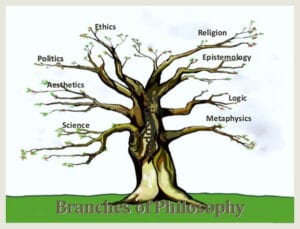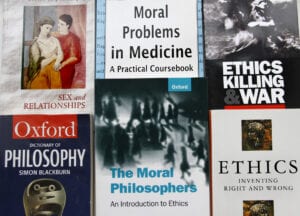A Level Philosophy, Religion and Ethics
About the Department
The department consists of two qualified, highly committed and enthusiastic teachers: Simon Barratt and Ian Kennedy. There are about 150 students studying A Level. The A Level course at Greenhead covers three main areas of study: Philosophy of Religion; Ethics; and Buddhism. Many of our students go on to study Philosophy related courses at top universities including Oxford and Cambridge.
Why study this subject?
Do you enjoy thinking about life’s big questions? For instance:
- Ethics. What is the nature of good? And what does it mean to live a good life? How do we decide what is right on issues such as euthanasia in medical ethics, human rights, sexual ethics e.g. what is the purpose of sex?
- Metaphysics. What is the nature of reality? Does God exist? If there is a God, why does he allow so much evil and suffering? Do humans have free will? Is the mind independent from the body? Is there life after death?
- Epistemology. What is knowledge, and what distinguishes it from mere belief or opinion? eg. how do we know that our ideas about what is morally good are true? What is truth?
- Language. How is it that language expresses meaning? How it is that language comes to refer to the world? Is it possible to use language to talk about God?
- Politics and Law. How should society be organised? What is justice? What are ‘rights’?’ etc.
- Science. What is science, and how does it challenge religious belief?
If you have an enquiring mind and enjoy philosophical debate and are interested in what some of the world’s greatest thinkers, scientists and religions have to say, then this is definitely the right subject for you! The course includes educational visits to Philosophy and ethics conferences, places of Buddhist interest as well as a residential trip to London. In the last two years, popular speakers in the field of Philosophy, such as Dr Peter Vardy and Dr Stephen Law have visited College and given revision conferences for us.
Students are expected to undertake 3-4 hours of independent work each week for this subject.
Topics you will cover
The A Level course is linear and covers three main areas of study over a period of two years – Philosophy of Religion, Ethics and Buddhism, as shown below:
Content Overview to be assessed at the end of the second year by examination only – no coursework.
1. Philosophy of religion:
• Plato, Aristotle and early philosophical thought on the nature of soul and existence
Arguments for the existence or non-existence of God, including challenges from science;
• The nature and influence of religious experience and ideas about the nature of God
• Challenges to religious belief such as the problem of evil and suffering;
• Language and how it is applied to God and religion
2. Ethics:
• The meaning of ethical language;
• The study of ethical theories e.g. natural law, Kant’s deontological ethics, utilitarianism, situation ethics, Aristotle’s virtue ethics etc;
• The application of these theories to the study of practical ethical issues in particular to medical ethics, human rights, sexual ethics, and business ethics
3. Buddhism:
• The Life of the Buddha and influences on his teaching and practice.
• Philosophical beliefs, values and teachings; including the meaning and purpose of life, ethics, the nature of reality, self, life after death , nirvana and meditation.
• Sources of wisdom and authority – texts and how they are used; key teachers and their teachings;
• Practices that shape and express religious identity’ including the diversity of practice within a tradition
Entry Requirements
In order to study Philosophy, Religion and Ethics at A Level you do not need to have studied it at GCSE. You will need to achieve Grade 5 in any of the following subjects: English Literature, English Language, History or Religious Studies.
Further Study and Careers
Further study
The new A Level in Philosophy, Religion and Ethics is a valuable entry qualification to post-18 education and all further education opportunities.
All universities accept and welcome students with a qualification in this area onto a variety of courses, in humanities, arts and sciences as well as to specific courses in Philosophy, Religious Studies, Comparative Religions, Theology or other related disciplines, such as History, English, Politics, PPE, and other courses including Medicine, Dentistry and Law – even science courses such as joint honours degrees in Physics and Philosophy etc.
A level course compatibility and Degrees
Philosophy, Religion and Ethics goes well with other subjects in the arts, sciences and social sciences. All universities including Oxbridge accept students with a qualification in this area onto a variety of courses: Philosophy, Religious Studies, History, English, Theology, Politics and Economics (PPE), and even courses in Medicine, Dentistry and Law – including joint science degrees such as e.g. Physics and Philosophy etc.
Careers
In the world of work, this is a great subject to take because it develops employability skills which all employers are seeking: researching and problem solving skills, self-management and team working skills, and communication skills. Understanding the beliefs and values of others is useful in lots of careers – working with people e.g. doctor, solicitor, dentist, social worker, police officer, nursing, council work, human resources manager etc., or in jobs requiring specialist knowledge e.g. teaching, journalism, television and the media, museum work, librarian, or even jobs in business e.g. marketing, advertising, public relations, architect etc.
Gallery
Philosophy News
-
2 February 2024 27 students secure coveted places at Oxbridge Universities Read More
-
26 October 2023 Philosophy Trip to London Read More
-
26 March 2021 Congratulations to Emily Brierly – our ‘Student of the Year’ Read More
-
12 March 2020 Philosophy students treated to revision session by Dr Greg Barker Read More
-
18 July 2019 Philosophy trip to London 2019 – A reflection on living in harmony with others Read More
-
22 March 2019 A day out at the Philosophy Gym Read More
-
19 November 2018 A Brilliant Day of Buddhism Read More
-
11 July 2018 Students visit London for annual Buddhism trip Read More








